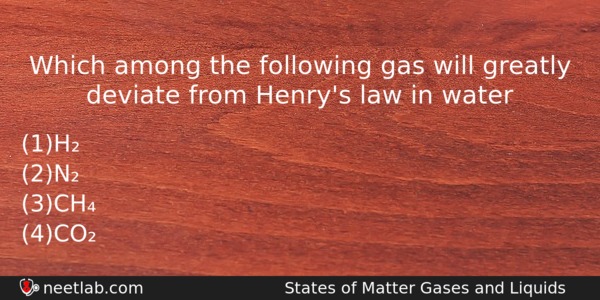| ⇦ | 
| ⇨ |
Which among the following gas will greatly deviate from Henry’s law in water
Options
(a) H₂
(b) N₂
(c) CH₄
(d) CO₂
Correct Answer:
CO₂
Explanation:
Gases obey Henry’s law provided
(i) the gas is not highly soluble and does not enter into chemical combination with the solvent.
(ii) the gas does not dissociate.
CO₂ does not obey Henry’s law in water as it combines with H₂O to form carbonic acid. CO₂ is more soluble than hydrogen and oxygen in water.
Related Questions: - Bleaching powder is obtained by treating Cl₂ with
- Surface water contains
- Treatment of cyclopentanone with methyl lithium gives which of the following species
- To which of the followings the Dalton’s law of partial pressure is not applicable
- Oxidation number of chromium in Na₂Cr₂O₇ is
Topics: States of Matter Gases and Liquids
(80)
Subject: Chemistry
(2512)
Important MCQs Based on Medical Entrance Examinations To Improve Your NEET Score
- Bleaching powder is obtained by treating Cl₂ with
- Surface water contains
- Treatment of cyclopentanone with methyl lithium gives which of the following species
- To which of the followings the Dalton’s law of partial pressure is not applicable
- Oxidation number of chromium in Na₂Cr₂O₇ is
Topics: States of Matter Gases and Liquids (80)
Subject: Chemistry (2512)
Important MCQs Based on Medical Entrance Examinations To Improve Your NEET Score
18000+ students are using NEETLab to improve their score. What about you?
Solve Previous Year MCQs, Mock Tests, Topicwise Practice Tests, Identify Weak Topics, Formula Flash cards and much more is available in NEETLab Android App to improve your NEET score.
Share this page with your friends

Leave a Reply